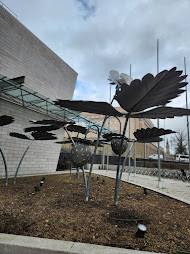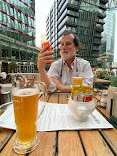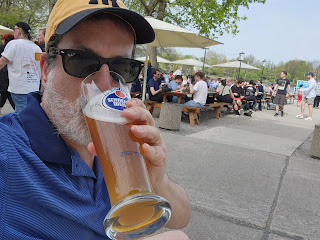Mrs. Spew is spending a couple of weeks with me in Europe, so I thought we would wander through the middle of Germany before going to northern Italy. We wanted to see some castles and some history, and we have gotten a heap of both.
Our first stop was Dresden, which, of course, resonated with me since I read Slaughterhouse Five in high school, which was in the context of the firebombing that utterly destroyed the city and is now seen as something far worse than gratuitous.We saw occasional memorials and unrepaired walls here and there, but it was mostly out of sight. Definitely not out of our minds. We stayed in the old town area, which is how we maximize the walking and the sightseeing. We were close to the massive central cathedral, heaps of palaces (now museums), city halls, and the river. We had some excellent food here including both Spanish and German tapas (best German food I have had, I think, in my three months here). There was a wonderfully silly, cheesy "experience" where one gets some headphones to listen to the narration of a character from long ago trying to figure out how he died as we get a tour of the remnants of the fortress. We also went into a pretty amazing art museum that had a great collection of statues including a replica of David and a display of East Germany/communist era art, which tended to focus on American imperialism.

We spent our next morning at Schloss Weesenstein, which is between Dresden and the border with Czechia. It looked v ery small and uncastle-like from the road, but very big and very castle-ish from the inside. It had some very funky display tendencies including paintings that would then have a figure/mannequin sticking out of it to give the face in the picture a 3-D body. It was one of the places where the Nazis put (stolen) art to protect it from the bombing with the castle at Nuremberg being another.
Speaking of which, Nuremberg is pretty spectacular. On the way in, we stopped by the Zeppelin grounds where the Nazis had huge rallies. The structures don't look the same, in part because the American troops blew up the giant swastika on the platform, and partly because other parts of the superstructure were falling apart, so they got demolished. It was strange to be standing exactly where Hitler stood way back when. We then drove into Nuremberg, where google maps led us astray a bit. We managed to get to our hotel and then walked around, yes, the older part of town.
A very pretty river runs through the city. We went up to the hill to the Imperial castle that overlooks the town. We spent most of our time there, looking at the gardens and going through the museum. It had lots of medieval armor/arms displays and much discussion of how imperial rule worked. The emperor didn't stay put, but would visit castles around the empire to network, to show that his authority was everywhere, to rule on local disputes, etc. The big tower had at the top pictures on each side, showing what that view looked like before the war, at the end of the war, and then after the rubble was picked up. Nuremberg got hit very hard by allied bombing--because of its symbolic importance as well as being a transportation hub and industrial center.
And then to put all this into context, on our way out, we stopped by the Nuremberg Trial Memorial/Museum. there was a whole lot of history packed into a relatively small space. Surprisingly, nearly all of the text was in German despite the tribunal being an English/French/Russian affair, and a sharp contrast to the rally grounds displays. So, we had to listen to the audio guide read the English translation of the displays. It slowed us down a bit, and we had to skip some stuff. But a fascinating experience and a nice bookend to the rally grounds.
Then it was on to Erfurt, a smaller city that avoided being bombed. I asked my wife which of the places we visited had the highest burgermeister/meisterburger quotient, and Erfurt edged out the others. A really beautiful town with a funky covered bridge with shops, a very large citadel, and more ice cream stores per linear meter than pretty much anywhere else.
 |
| Why they have a bread dude statue? I have no idea. |
Random observations along the way
- I guess the whole thing of densely populated areas is that the areas in between are empty? So much of the roads in between these places had nothing but farms, windmills, and solar panels.
- Autobahn! Superfast but lots of places with strict limits--keeps you awake. The roads are so well constructed that it is easy to go uber-fast without feeling it--our rental car is also pretty smooth. So, yeah, I have generally been driving at speeds that I would never approach in North America... while still getting passed by much, much faster cars.
- Strange parking processes. In a mall in Leipzig, the parking machine spit out a yellow token, not a ticket. So, when I returned to the car, I had to put the token into a normal payment machine, which I had expected to spit out a ticket. Nope, it spit out another token. But it worked. In another
parking structure, it takes a picture of your license plate, so on your way to your car, you enter your license plate number into the machine and it spits out a ticket to let you out of the lot? - Speaking of driving, I learned how to drive a manual in high school, shortly after passing my driving test. My mother's Datsun 310 only had four gears plus reverse. I did learn the funkiness of how to get some sticks into reverse when I was a parking attendant in high school--yes, they hired a 16 year old! Anyhow, after leaving home, my manual car experiences have been far apart and few, like when I landed in Brussels to drive to the Arnhem bridge (it was not too far for me, but my next stop was as jet lag hit me hard) about fourteen years ago. So, this rental SUV has got six gears, which means I sometimes put into third rather than fifth or fourth rather than sixth. Oops. Oh, and my first gear skilz (the hardest gear) are not so great. So, a few clumsy starts at stop lights. Unlike the hard time I had figuring out how to get into reverse at the forementioned Brussels airport, I quickly realized the trick with this car was pushing down on the stick to get it into reverse.
- Lunches on the road didn't always work out. We kept finding restaurants near our routes to be closed--on the way out of Dresden/Schloss and in Bamberg in between Nurenberg and Erfurt. We ultimately just waited to eat in Leipzig. In Bamberg, we settled for a Turkish doner cart in the parking lot of a grocery store, and, as all of my Turkish doner experiences have been in Germany this year, it was super tasty.
- I don't remember the trams being this fast in Berlin. In Erfurt and in some of the other places, they are fast and jeez, they are close to the sidewalks.
Tomorrow, we drive back to Berlin, drop off the rental car, and get on a plane to Venice. We will have about five days in Italy split between Venice and Milan. I have never been to either place, and Mrs. Spew last visited ... before Iran-Contra. She has been keeping me from getting gelato since it supposed to be pretty good where we are going.
Auf wiedersehn!































